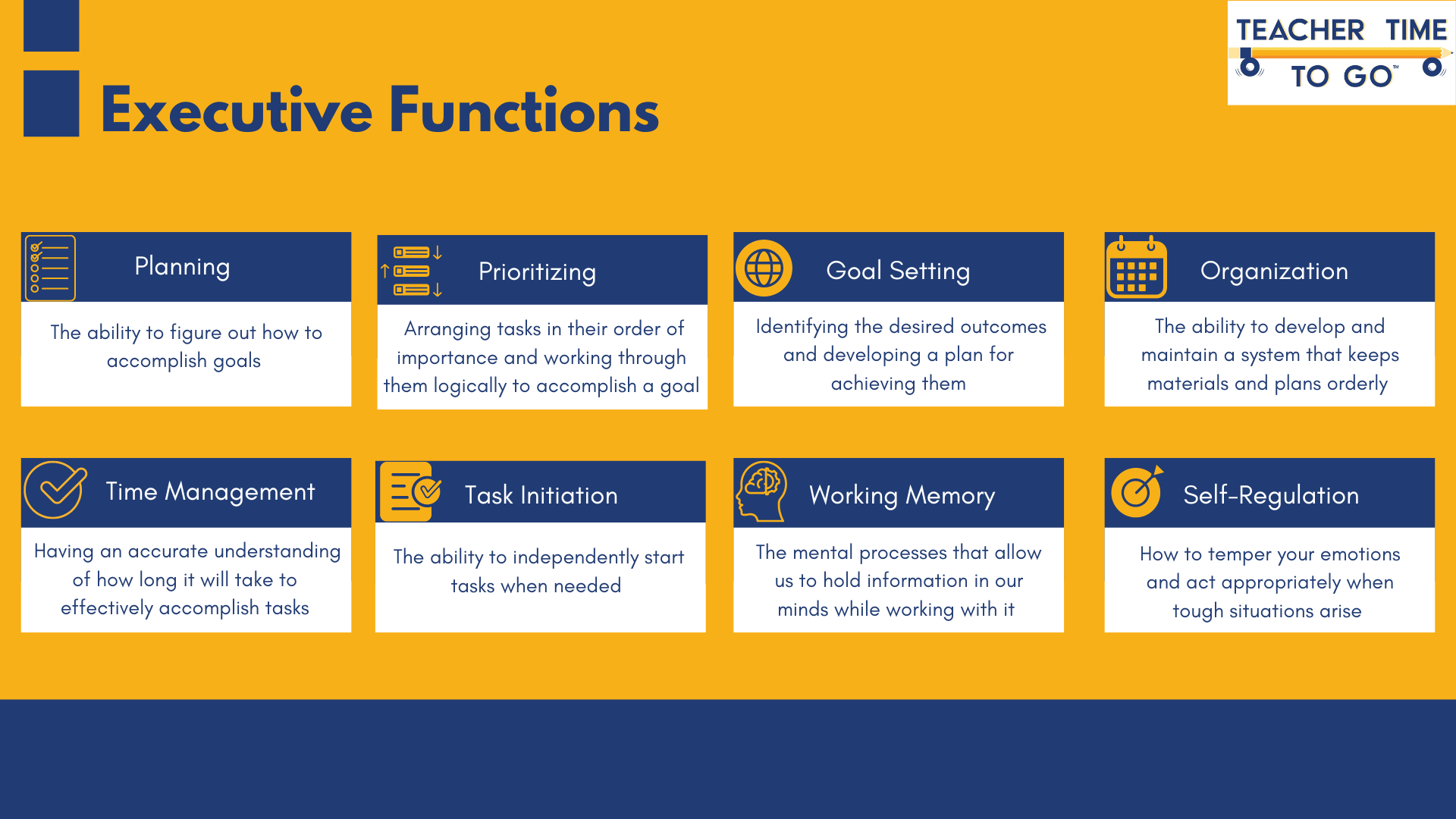Executive Functioning is best understood as the skills we use every day to learn, work and manage daily life. You can think of the term as the skills required to execute tasks.
This is the 6th post of an 8-part series highlighting Executive Functioning Skills. You will find definitions, parent recommendations and strategies that can be implemented for immediate support at home for families or in the classroom for teachers. My hope is that by helping you to understand what Executive Functioning is, you’ll be able to best support your child!
This post is all about Task Management. Task Management is comprised of task initiation, task management and task completion. This is the ability to start a task or activity without procrastinating or getting distracted. It’s important because it helps us get things done and achieve our goals.
This can look like overcoming procrastination, positive self talk and perseverance.
First and Foremost
Strong task management offers several benefits, including:
- Increased Productivity: Getting started promptly allows you to complete more tasks in less time, enhancing overall productivity.
- Reduced Procrastination: Strong initiation skills help combat procrastination, leading to a more proactive approach to work and responsibilities.
- Improved Time Management: Effective task initiation enables better planning and prioritization, helping you allocate your time more efficiently.
- Lower Stress Levels: Starting tasks on time can reduce the anxiety associated with looming deadlines, resulting in a calmer mindset.
- Enhanced Focus: Strong initiation skills often lead to improved concentration, as you’re less likely to get sidetracked once you begin.
- Greater Goal Achievement: Being able to start tasks promptly means you’re more likely to achieve your goals, whether they’re short-term or long-term.
- Boosted Confidence: Successfully initiating tasks can build self-esteem and confidence in your abilities, reinforcing a positive cycle of productivity.
- Better Work Quality: With more time available, you can focus on quality and detail, leading to better outcomes.
- Increased Motivation: Initiating tasks can create momentum, making it easier to tackle more complex or challenging work.
- Stronger Habit Formation: Regularly starting tasks builds positive habits, making it easier to initiate work in the future. Cultivating strong task initiation skills can significantly enhance both your personal and professional life!
Overview
Task Management can look very different for different people but here are some general ways that we can best understand how we can help:
1. Procrastination means to avoid or delay doing a task. There are many reasons why we might procrastinate doing something. Maybe we are afraid of failing the task, perhaps we have something better we’d rather be doing, or maybe we really did mean to start a task but then got distracted. Regardless of the reason why, procrastinating important tasks can have negative consequences in our lives. When we procrastinate, our to- do list keeps getting bigger. Procrastinating can also have a negative impact on our mind. Knowing we must do something, but avoiding it, can cause us to become stressed and nervous. There are a few different strategies we can use to reduce procrastination such as:
- Rewarding your child after a hard task is completed,
- Setting a timer to get started or for a break is a great way to stay on task.
- Visualizing yourself completing the task. If you are feeling overwhelmed or nervous about starting a task, it can be helpful to close your eyes and think about how you will feel when the task is complete.
2. Positive self talk is an extremely helpful coping skill for improving task initiation. When we talk to ourselves in a positive way, it can help us feel more confident and motivated to start a task. We can say things like, “I can do this,” “I’ve done it before, I can do it again,” or “I’m going to feel so good when I finish this task.”
3. Perseverance means to continue doing something, even when it becomes difficult or takes longer than we expected. Often when we start a big task, we will come across difficulties before the task is finished. But we cannot give up just because a task becomes hard. When things get difficult some things you can do to refocus is to take a break, remember your motivation or simply thinking about how far you have come!
Resource Recommendation
For task initiation, I love this dry erase and magnetic chart. This helps to promote effective habits by fostering positive development in children. This innovative tool extends beyond task management, instilling habits such as responsibility, routine, and good manners.
Final Thoughts
The biggest takeaway for Task Management is to understand the intrinsic motivation behind getting started on assignments. Once the assignment is initiated, setting mini goals (chunking) to execute and complete!
Next up in the series we’ll be discussing the skill of Working Memory
As a reminder, during this series we will go into detail about each of the Executive Functions along with a specific user friendly definition and support strategies. The chart below will guide the series!

Here at TT2G, we are working with about 500 families in the local community. Approximately 75% of our families request some sort of Executive Functioning Support. As you can see, this set of skills is a highly sought after service. Reach out to us if you feel that your child could use support in any of these areas. We have a variety of services that can best meet the needs of your student, from group workshops to individual assessment and support plans.
If you’d like to review the other posts in the series, you can find them here: Executive Functioning Overview, Prioritization, Goal Setting, Organization and Time Management.
Have a Task Management Strategy that works for you? We’d LOVE to hear from you!
Live.Laugh.Learn,
Jenn



